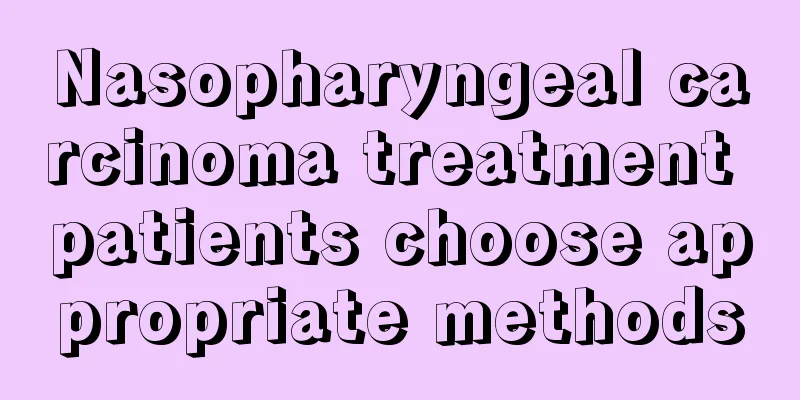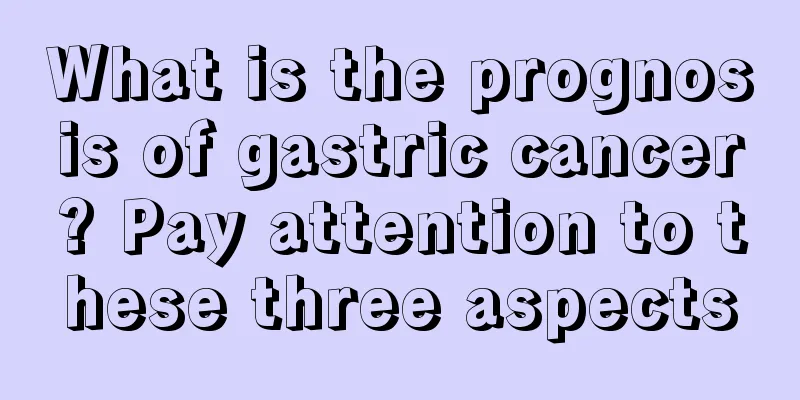Nasopharyngeal carcinoma treatment patients choose appropriate methods

|
Nasopharyngeal carcinoma is a type of cancer, and the current incidence of this cancer is relatively high. With the continuous development of society, more and more people are suffering from this cancer. So, what are the treatments for nasopharyngeal carcinoma? Let's take a look at the main treatments for nasopharyngeal carcinoma . Treatments for nasal cancer include radiotherapy, traditional Chinese medicine, surgical treatment, and immunotherapy. Radiotherapy is considered the preferred treatment for nasal cancer. Nasal cancer is sensitive to radiation. Radiotherapy for nasal cancer kills tumor cells, but normal tissues or organ cells are also inevitably affected by radiation. Common reactions include: systemic radiation reactions: including fatigue, dizziness, loss of appetite, nausea, vomiting, tastelessness or change of taste in the mouth, insomnia or drowsiness, etc. Mucosal reactions: After 40Gy of radiation, the mucosa in the oropharynx, nasopharynx, nasal cavity, and paranasal sinuses may experience mucosal edema or congestion, increased exudation, and in severe cases, punctate or flaky white film. During the irradiation process, sore throat, difficulty eating, and nasal congestion are common. Surgery is only used for patients with stage I nasal cancer. It is not suitable for patients with stage II, III, and IV nasal cancer. It is also easy to metastasize or relapse after surgery. Radiotherapy is the first choice, but in view of the strong toxic and side effects of radiotherapy, Chinese medicine is often combined with clinical treatment of nasopharyngeal cancer. On the one hand, it improves the symptoms of nasopharyngeal cancer, and on the other hand, it reduces the toxic and side effects of radiotherapy and improves the body's immune function. In traditional Chinese medicine, nasal cancer belongs to the category of "nasal sinusitis" and "nasal glanders". Traditional Chinese medicine treatment of nasal cancer emphasizes syndrome differentiation and treatment, that is, it is necessary to make a systematic diagnosis based on the patient's condition and physical condition, and carry out specific treatment according to the type of patient. These are the introductions to the treatment of nasopharyngeal carcinoma. After reading the above introductions, everyone should know what are the common treatments for nasopharyngeal carcinoma. I hope that the above introductions to the treatment of nasopharyngeal carcinoma will be helpful to patients, and I hope that patients can recover soon. |
<<: Three major laryngeal cancer symptoms that need attention
>>: We must do a good job in lung cancer prevention in our daily life
Recommend
Makeup Essentials for Beginners
Makeup is a very important activity in life, espe...
Several obvious symptoms of bone cancer
Clinically, some symptoms of bone cancer are quit...
Can I put green radish in a pregnant woman's room?
The leaves of the green radish are extremely deli...
What are the complications after cataract surgery?
Cataract is a relatively common eye disease, whic...
Is white precipitate from boiled water poisonous?
Sometimes when we use tap water to boil water, we...
How to measure body temperature with a rectal thermometer
As we all know, the most common way to measure bo...
Sequelae of iodized oil fallopian tube radiography
In life, many couples who have not gotten pregnan...
What are the common symptoms of early liver cancer? Teach you to know the three major symptoms of early liver cancer
Regarding the early symptoms of liver cancer, exp...
How long can freshly squeezed watermelon juice be kept
We usually consume freshly squeezed watermelon ju...
What is the best diet for patients with esophageal cancer
Since esophageal cancer patients have high dietar...
Early symptoms of uterine cancer
Early symptoms of uterine cancer: The early sympt...
What are the dietary precautions for prostate cancer patients
The diet of prostate cancer patients is not much ...
What are the possible causes of mid-abdominal pain?
Many people's abdominal pain is not localized...
How to diagnose skin cancer? 3 dietary treatments you must know for skin cancer
As the incidence of skin cancer increases, more a...
The difference between black tea and Pu'er tea
From an outsider's perspective, there is not ...









